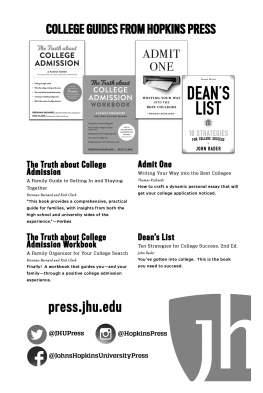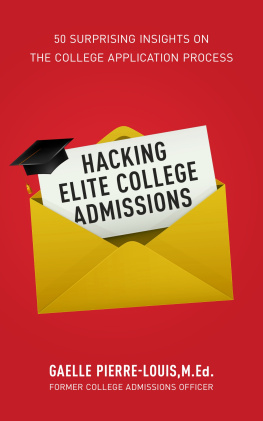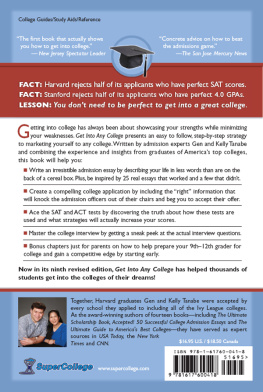M y absolute favorite movie about the Harvard experience is 1973s The Paper Chase. The film tells the story of Professor Kingsfield, the commanding legal scholar, and his relationship with the green gang of first-year law students who enter his lecture hall each September. For the most part, the cast consists of archetypal charactersthe insecure know-it-alls; the hard workers who cant make the grade; the privileged cruisers with cushy jobs waiting for them on the other end; and the needle-in-the-haystack really smart guy who made it to Harvard without connections or pedigree. In this case, the really smart guys name is Hart (all the fellas go by their last names).
About halfway through the movie, Hart, who simultaneously adores and abhors the icy Kingsfield, learns that the Harvard Law School library keeps an off-limits archive of the handwritten class notes that their professors took when they themselves were law students. Fueled by his obsession with Kingsfield, Hart decides to risk his academic standing and future career by convincing one of his classmates to help him break into the annals. Hart believes that if he could just access the professors old notes, perhaps he could penetrate his mind as well.
The screen is dark except for the beam of a flashlight illuminating the wire cages of paper, scanning the stacks. Soon, Hart discovers Kingsfields dusty notebooks. He freezes and stands there slack-jawed, like he has just discovered the Holy Grail. This is it, Hart says to his colleague. This is the ageless passage of wisdom.
The idea that wisdom is somehow caged or exclusive is the central and brutal irony of Harvards status as an American icon. Like so many students, Hart fetishizes Harvard. He has already been accepted to Harvard Law Schoolhe is an insideryet he strives for some wisdom or understanding that is out of his reach. Such is an environment where achievement will always be elusive and real success is impossible. At its worst, it is the resurrection of a modern-day golden calf.
Nowhere else is this phenomenon more pronounced than in the selective college admissions process, the gatekeeping mechanism that has so many otherwise rational, accomplished individuals experiencing unrivaled anxiety and panic. It doesnt help that it is harder today than ever before to get into a selective college. Harvard College turned down almost 21,000 candidatesincluding thousands of valedictorians and students with perfect SAT scoresin 20062007. That same school year, Columbia University denied admission to about 16,500 high-achievers. And Stanford University sent out approximately 21,500 rejection letters to ambitious applicants across the globe.
With competition at an all-time high, grooming for a spot at a top college has become a full-time job for scores of Ivy League hopefuls, who literally spend years studying for the SAT, loading up on Advanced Placement courses, and accumulating brag-worthy rosters of extracurricular activities. Across the nation, dinner table discussions are dominated by college talk, and some parents will stop at nothing to give their child every advantage. They hire high-priced consultants to help with educational decisions, from choosing the best nursery school to the best academic enrichment programs to the best internships, community ser vice activities, and sports programs.
Too many communities are enmeshed in a collective obsession with achievement and accomplishment. And almost everyone involvedeven admissions officers and college presidentsat some point feels victimized by the admissions process. We are in the midst of a cultural craze. I call it the Fat Envelope Frenzy.
The Fat Envelope Frenzy is somewhat predicated on the myth that college admission is contingent solely on merit. In reality, colleges often use their admissions policies to accommodate numerous stakeholders and accomplish various goals that are not always aligned. Prestigious colleges strive to attain diverse student bodies, while favoring the children of alumni and generous donors. They want all-star football teams and several Rhodes Scholars in each class. They recruit low-income students, but tie their admissions policies to performance on the SAT, which gives a well-known advantage to high-income students who are able to enroll in test-prep classes and gain access to pricey private tutors. Simply put, college admissions policies are confusing because colleges are confused. American higher education does not have a single, clear mission.
Seven years ago, I accepted a position as Assistant Director of Admissions at my alma mater, Dartmouth College. I was hired to give on-campus information sessions, recruit students by traveling to high schools and college fairs, interview dozens of applicants, and read and evaluate thousands of applications. For the most part, the students I met were delightful, accomplished young men and women. Of course, most were inevitably turned away, despite their potential and appeal. There were simply too many deserving candidates vying for a limited number of spots.
College admissions officers wear many different hats, depending on the time of year and the type of applicant with whom they are interacting. In the fall and spring, the staff hits the road for recruitment trips to give information on admissions procedures and, basically, sell the school. Part of the job includes driving up application numbers. Even the most popular universities find it essential to maintain a high degree of selectivity because external evaluators, like U.S. News & World Report, emphasize this in their rankings. The trick for admissions officers is to strike a balance between acknowledging the low acceptance rates at their institutions while simultaneously encouraging as many students to apply as possible. My personal strategy for mitigating these conflicting objectives was to distance myself from the students I met. I would go so far as to cut them off or redirect the conversation if they started telling me about their academic credentials and personal accomplishments, or asking questions along the lines of What are my chances of getting in? If I knew nothing real about these students, I could ignore the fact that the vast majority of them (about 80 percent of Dartmouth applicants at the time) would eventually be turned away. Like the students themselves, I focused on the positive. I persuaded every high schooler I met to take a chance at applying to the Ivy League.
Everything changed once the applications were submitted in the winter. My sunny, welcoming disposition was replaced by no-nonsense assessment. Its not that I didnt like, appreciate, or respect the applicants (many of whom were more qualified than I had been when I applied). But I quickly learned that I had to evaluate each candidate based on his or her potential contribution to the school. Of course, grades, SAT scores, essays, recommendations, and extracurricular accomplishments matter, but so does satisfying trustees and/or alumni by recruiting winning athletes, admitting legacy applicants, and attracting big donors. Most admissions officers are genuinely concerned with creating opportunities for talented students from underrepresented racial and socioeconomic backgrounds. However, they are bound by competing institutional interests that limit their power to recruit students who may not have had extensive college preparation or coaching.





